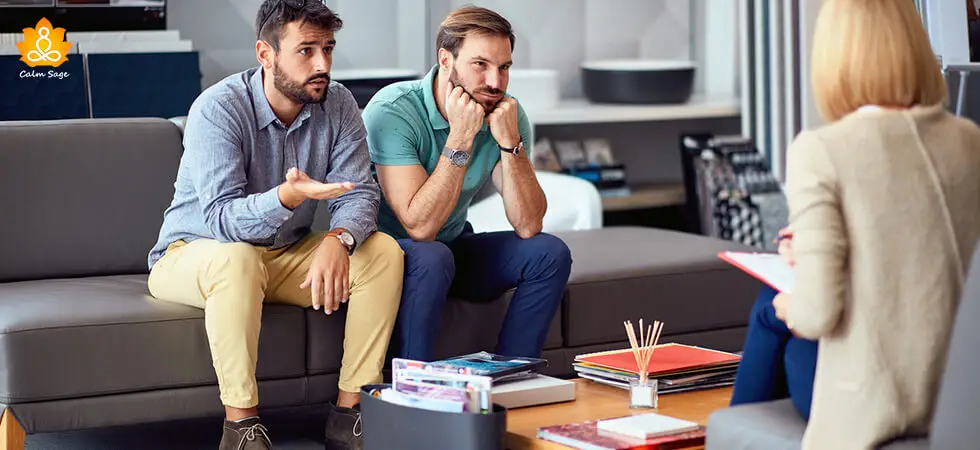We live in an era where diversity and inclusivity take center stage, but even now, gay relationships can face unique challenges. Have you ever wondered if there’s help out there to navigate these difficulties? Well, the answer is yes – Gay Relationship Therapy.
From understanding the concept of gay relationships to diving into the process of therapy, its benefits, and even how to choose the right therapist, we’ll delve into everything you need to know about this specialized form of counseling. So, let’s quickly dive in and explore!
Contents
- 1 When Do Gay Couples Need To Go For Relationship Therapy?
- 2 How Can Therapy Help Couples With Their Challenges?
- 3 How Does Relationship Therapy Work?
- 4 Techniques Involved in Therapy Sessions
- 5 Is It Embarrassing to Go for Gay Relationship Counseling?
- 6 How to Find Gay Relationship Therapy Near You?
- 7 Can Therapy Sessions Be Conducted Online?
- 8 Conclusion
When Do Gay Couples Need To Go For Relationship Therapy?
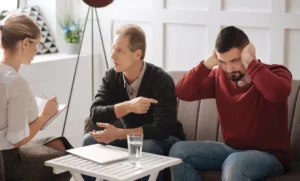 Deciding to seek therapy is a significant step in any relationship, and it’s often triggered by various factors. Here are some instances when gay couples may find it beneficial to consider Gay Relationship Therapy:
Deciding to seek therapy is a significant step in any relationship, and it’s often triggered by various factors. Here are some instances when gay couples may find it beneficial to consider Gay Relationship Therapy:
- Communication Breakdown: When couples struggle to communicate effectively, misunderstandings can breed, leading to arguments and resentment. Therapy can offer tools and techniques to improve communication, fostering better understanding.
- Recurring Arguments or Never-Ending Conflicts: If the same issues resurface repeatedly without resolution, or if the conflicts seem endless, it’s a clear sign that the couple might need professional help. Therapists can help identify the root cause of these conflicts and guide couples to resolve them.
- Feeling Distant: If either or both partners start feeling distant or disconnected, it might indicate a problem. Therapists can help re-establish the lost connection and reignite the spark in the relationship.
- Coping with Discrimination or Stigma: Gay couples often face societal discrimination or stigma. A therapist can provide support and strategies to handle such pressures, promoting mental well-being and relationship health.
- Breakdown of Trust: Trust is the bedrock of any relationship. If there’s been a breakdown of trust due to lies, secrets, or infidelity, therapy can facilitate healing and the rebuilding of trust.
- Consideration of Divorce: If divorce or separation has been contemplated, it’s crucial to seek therapy. A trained professional can help explore these feelings, address the underlying issues, and potentially guide the couple towards reconciliation.
Remember, therapy isn’t just for when things go wrong. It’s also a proactive measure to enhance relationship satisfaction, improve understanding, and strengthen the bond. Even healthy couples can benefit from the insights and personal growth that therapy offers.
How Can Therapy Help Couples With Their Challenges?
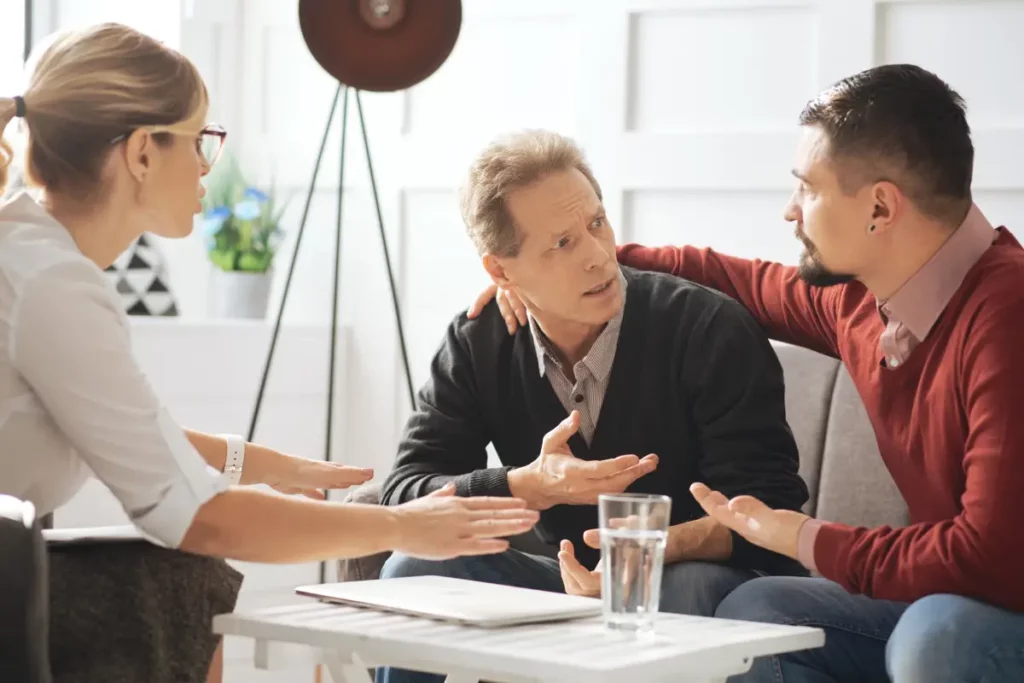
Gay Relationship Therapy is an effective tool that can help couples address and overcome their unique challenges. Here’s how therapy can make a difference:
- Improved Communication: Therapy offers techniques for effective communication, helping couples to express their thoughts and feelings clearly and constructively, thereby reducing misunderstandings.
- Conflict Resolution: Therapists help identify recurring issues, understand their root causes, and guide couples towards resolving these conflicts. They provide strategies to manage disagreements healthily and constructively.
- Rebuilding Trust: In cases where trust has been breached, therapists aid in the healing process. They provide strategies to rebuild trust and restore the relationship’s foundation.
- Handling Major Transitions: Therapy can provide guidance and support during significant life transitions, easing the stress and helping couples navigate these changes together.
- Support Against Discrimination and Stigma: Therapists can provide crucial support for gay couples facing societal pressures. They offer strategies to cope with discrimination and stigma, which can strengthen the relationship and promote mental well-being.
- Exploration and Understanding: Therapy encourages self-reflection and exploration, leading to greater self-understanding and awareness of one’s own emotions and behaviors. This insight can also promote a better understanding of the partner.
- Preventing Separation or Divorce: When a couple is contemplating separation or divorce, therapy can help them explore these feelings, address the underlying issues, and potentially steer the relationship towards reconciliation.
- Increased Intimacy: Therapy can help couples deepen their emotional and physical intimacy and can enhance the emotional and physical connection between partners, fostering a more intimate and fulfilling relationship.
By facilitating open and honest conversations in a non-judgmental setting, therapy can foster understanding, empathy, and connection, helping couples overcome their challenges and build healthier, happier relationships.
How Does Relationship Therapy Work?
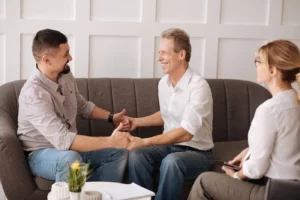 Relationship therapy, including Gay Relationship Therapy, follows a structured process to address the challenges couples face and help them build healthier relationships. Here’s an overview of how therapy typically works:
Relationship therapy, including Gay Relationship Therapy, follows a structured process to address the challenges couples face and help them build healthier relationships. Here’s an overview of how therapy typically works:
- Initial Assessment: The therapeutic journey begins with an initial assessment. The therapist meets with the couple to understand their concerns, relationship dynamics, and goals for therapy. This assessment helps the therapist tailor the treatment approach to the couple’s specific needs.
- Therapy Sessions: Regular therapy sessions are scheduled, usually on a weekly or bi-weekly basis. During these sessions, the therapist creates a safe and non-judgmental space for open dialogue. Both partners have the opportunity to express their thoughts, emotions, and concerns.
- Identifying Patterns: The therapist helps the couple identify patterns of behavior, communication styles, and underlying dynamics that contribute to their challenges. By recognizing these patterns, couples can gain insight into their relationship dynamics and work towards positive change.
- Homework Assignments: Therapists often provide homework assignments to practice the skills learned in therapy. These assignments can include communication exercises, journaling, or practicing specific behaviors. They reinforce the therapeutic work and help couples apply the learned techniques in their everyday lives.
- Continued Support: Therapy is a journey, and the therapist provides ongoing support and guidance throughout the process. They help couples navigate challenges, celebrate progress, and adjust the treatment approach as needed.
Through these steps, relationship therapy aims to improve communication, resolve conflicts, rebuild trust, and foster a healthier and more satisfying relationship.
Techniques Involved in Therapy Sessions
In therapy sessions, therapists utilize various techniques to help couples navigate their challenges and work towards building healthier relationships. Here are some commonly used techniques in relationship therapy:
- Emotionally-Focused Therapy (EFT): EFT focuses on identifying and addressing underlying emotions and attachment patterns in relationships. Therapists help couples recognize and express their emotions, fostering a deeper understanding and connection.
- Cognitive-Behavioral Therapy (CBT): CBT aims to identify negative thought patterns and behaviors that contribute to relationship challenges. Therapists work with couples to reframe negative thoughts, develop healthier coping mechanisms, and change problematic behaviors.
- Solution-Focused Therapy: This approach emphasizes identifying and building on the strengths and positive aspects of the relationship. Therapists help couples set achievable goals and develop practical solutions to their challenges.
- Mindfulness Techniques: Therapists often incorporate mindfulness exercises into sessions to help couples cultivate awareness, presence, and emotional regulation. Mindfulness techniques can help reduce reactivity and enhance emotional well-being within the relationship.
- Role-Playing and Communication Exercises: Therapists may facilitate role-playing activities or provide communication exercises to improve the couple’s communication skills. These exercises allow couples to practice active listening, empathy, and effective expression of thoughts and emotions.
Is It Embarrassing to Go for Gay Relationship Counseling?
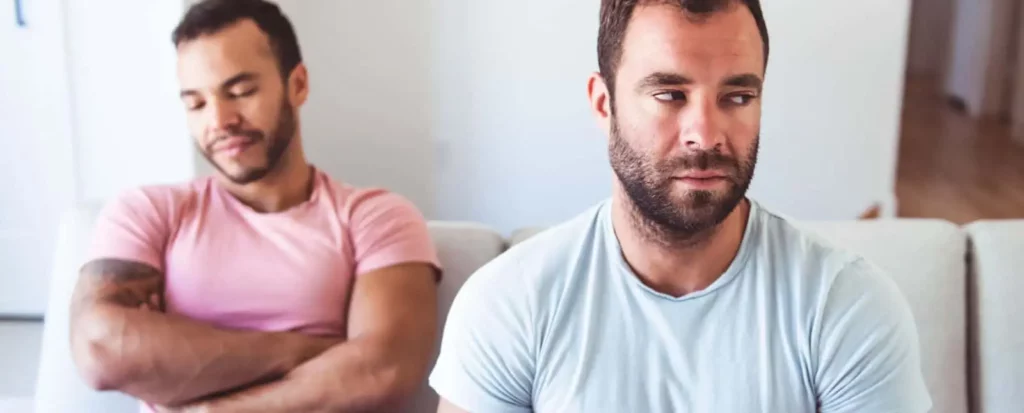
It is completely normal to have concerns or reservations about seeking counseling, including Gay Relationship Counseling. However, it is important to understand that therapy is a safe and confidential space where individuals and couples can explore their challenges and work towards building healthier relationships.
It is crucial to remember that seeking therapy is a proactive step towards growth, understanding, and improving your relationship. Therapy is not a reflection of weakness or failure, but rather a courageous decision to invest in the well-being of your relationship.
Therapists who specialize in working with gay couples are trained to create a supportive and non-judgmental environment. They are familiar with the unique challenges faced by the LGBTQ+ community and have the expertise to address them effectively. They are there to listen, provide guidance, and help you navigate your relationship dynamics.
Remember, therapists are bound by professional ethics and confidentiality rules. They are committed to maintaining your privacy and creating a safe space for you to share your experiences and concerns openly.
So, while it is natural to feel some apprehension, remember that gay relationship counseling is designed to help you and your partner thrive and create a more fulfilling relationship.
How to Find Gay Relationship Therapy Near You?
If you’re looking to find a gay relationship therapy provider near your location, here are a few steps you can take:
- Online Search: Start by conducting an online search using keywords such as “gay relationship therapy” or “LGBTQ+ couples counseling” along with the name of your city or area. This search can help you find therapists or counseling centers that specialize in working with gay couples.
- LGBTQ+ Community Centers: Check with local LGBTQ+ community centers or organizations in your area. They often have resources and referrals for LGBTQ+-friendly therapists who are experienced in working with gay relationships.
- Professional Directories: Explore professional directories, such as the Psychology Today directory, where therapists often list their areas of expertise and specialties. Use filters or search terms like “gay couples therapy” to find therapists who specifically work with gay relationships.
- Referrals and Recommendations: Seek recommendations from friends, family, or members of the LGBTQ+ community who may have had positive experiences with a therapist specializing in gay relationship therapy. Personal referrals can provide valuable insights and help you find a therapist you feel comfortable with.
- LGBTQ+ Support Groups: Join LGBTQ+ support groups or online communities where you can connect with others who may have recommendations or insights into local therapists who specialize in gay relationship therapy.
- Consult with LGBTQ+ Organizations: Reach out to local LGBTQ+ organizations or LGBTQ+-affirming mental health networks to inquire about therapists who provide gay relationship therapy services in your area.
Can Therapy Sessions Be Conducted Online?
 Yes, therapy sessions can be conducted online. Online therapy, also known as teletherapy or telecounseling, has become increasingly popular and accessible, especially in recent years. Many therapists offer online sessions to accommodate the needs and preferences of their clients, including those seeking gay relationship therapy.
Yes, therapy sessions can be conducted online. Online therapy, also known as teletherapy or telecounseling, has become increasingly popular and accessible, especially in recent years. Many therapists offer online sessions to accommodate the needs and preferences of their clients, including those seeking gay relationship therapy.
- Here are some benefits of online therapy:
- Allows you to attend sessions from the comfort of your own home or any location with an internet connection
- Eliminates the need for travel time, making therapy more accessible for individuals who may have limited mobility or live in remote areas
- Offers greater flexibility in scheduling appointments
- Online therapy opens up the possibility of working with therapists who may not be geographically located near you but specialize in gay relationship therapy
Conclusion
In conclusion, Gay Relationship Therapy offers a valuable resource for couples facing unique challenges in their relationships. Through therapy, couples can gain insights, learn effective strategies, and develop the necessary skills to navigate the complexities of being in a gay relationship.
Whether in-person or online, gay relationship therapy is designed to meet the specific needs of LGBTQ+ individuals and couples. It addresses the unique challenges faced by gay couples while promoting personal growth, emotional well-being, and a healthier relationship dynamic.
So, if you’re considering gay relationship therapy, remember that taking this step is a sign of strength, courage, and commitment to the well-being of your relationship.
Life may sometimes be challenging if you are a gay, but Online Gay Counseling can help. Get experienced LGBTQ therapists at PrideMantra: Book a trial LGBTQ therapy session
